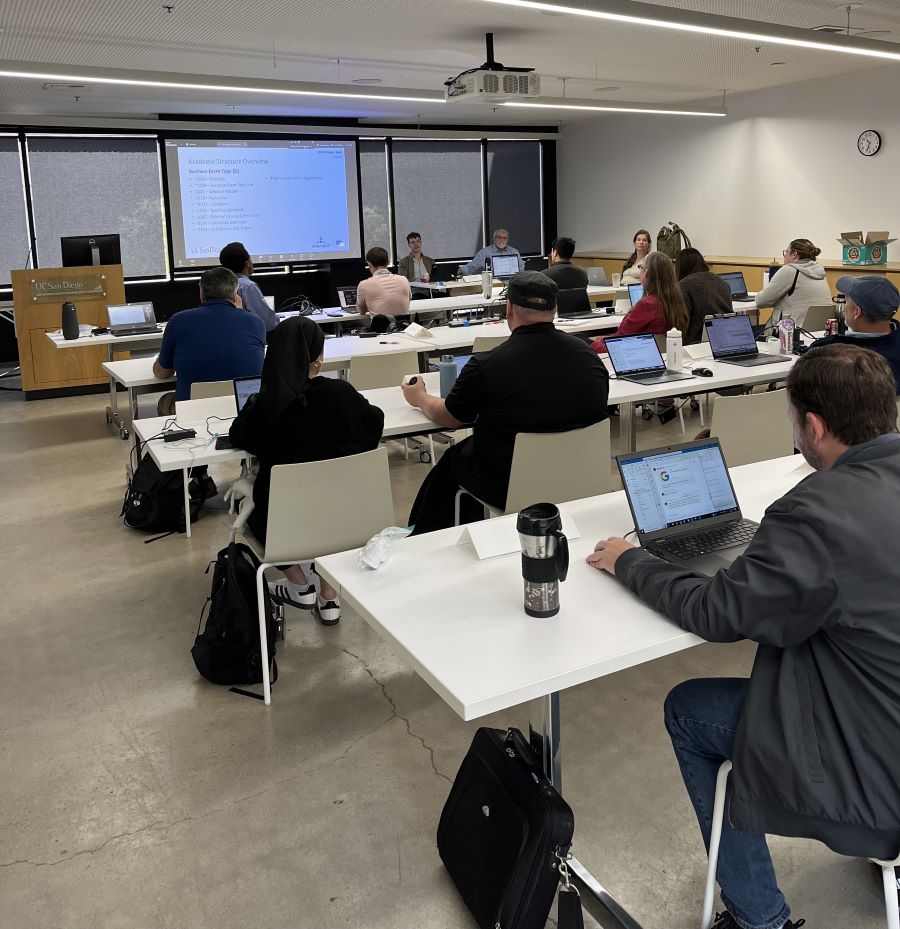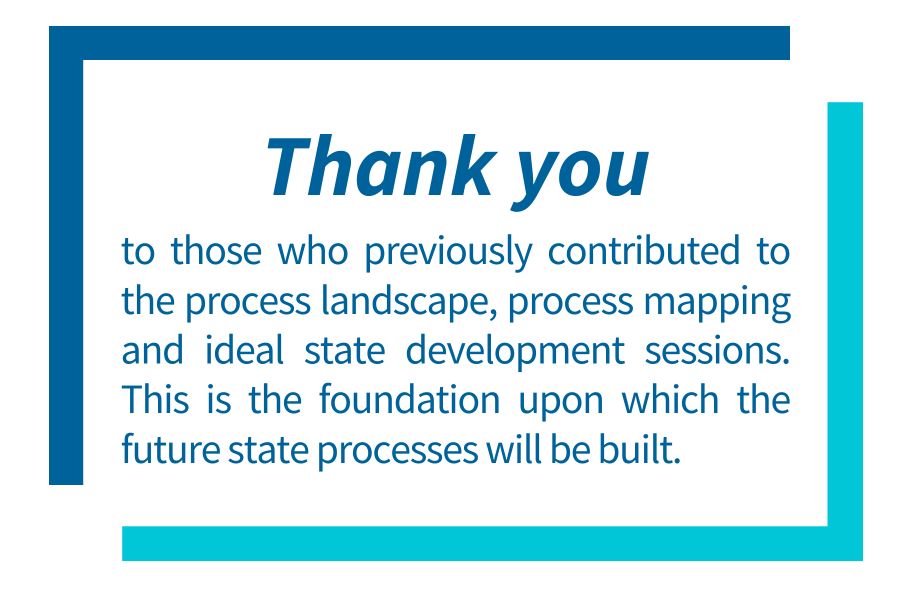Let’s Get Down to Business: Process Design Workshops
We have entered into a new, exciting phase of the Triton Student System (TSS) Project: Process Design Workshops. The introductory and advanced training sessions that were completed in March built the foundation for the 11-month journey of design workshops that began on May 6 and will continue until March 2025.
Our implementation partner, invenioLSI (iLSI), will serve as the “guide-on-the-side” to the project’s implementation team and will facilitate the design workshops to showcase how the system, Student Lifecycle Management (SLcM), works. This will enable the team to identify requirements–more detailed and granular requirements than the team previously listed–to inform the future configuration, design, building and testing of the system for UC San Diego. I met with iLSI’s David Calacci, SLcM Practice Director, and Tim McCready, Solution Architect, to talk more about the Process Design Workshops (PDW) and how iLSI will approach these sessions with UC San Diego.
What are Design Workshops?

The PDW are not static or one-way informational presentations–they are dynamic, engaging and informative discussions that will create mutual learning for both UC San Diego and iLSI. In essence, PDW are our opportunity to review, identify, discuss and develop our future state processes within the SLcM system in alignment with the project’s guiding principles.
A total of twenty-three processes have been identified and categorized into four process groups to help the team focus on similar process areas together. Through each PDW, the team members will learn more about the capabilities of the SLcM system and how it can meet UC San Diego’s needs. Additionally, because no system is perfect, the design workshops will also reveal which processes the system is not able to do or does in a different way than the current state. By being able to learn more about the functionality and configuration of SLcM, the team will also be equipped for conversations about data conversion requirements and historical student records.
Since this is approximately an 11-month journey, it will be an iterative process (as showcased in the figure below) that has the team constantly working and reworking the future state based on what is learned and developed in the PDW. With each PDW that the team goes through, they will learn more about the system’s capabilities, identify feature additions needed, develop plans, and review options and feedback as needed. In addition to grounding this process in the project’s guiding principles, the team will also be soliciting and incorporating feedback from other subject matter experts across campus, as well as calling on the project’s advisory committee to provide guidance as needed.

What is the Approach for the Workshops?
I asked Tim to explain how these PDW will be structured and how iLSI will engage the implementation team. “We will first demo how the process works natively in SLcM,” Tim explains, “and then we will listen to input from the subject matter experts about how the process works at UC San Diego. From there, we can see if there are additional configurations needed to support UC San Diego’s process and how we can achieve the same outcome in SLcM.”
David adds, “One of our main goals from these design sessions is to provide UC San Diego staff the ability to write 23 process design documents to support the university’s goals and mission.”
The process design documents (PDD) are one of the main deliverables of the PDW. Depending on the process groups being reviewed, it is the intention that each PDD will include:
- an inventory of requirements that can be met via SLcM’s out-of-the-box functionality,
- a record of feature additions that may be needed to support business processes,
- a list of integrations,
- and detailed analyses of how existing systems and applications will be utilized or modified for the future state (once the new system launches).
In order to develop the PDD effectively, David recommends that participants “remain open and non-judgemental,” because this way, “the university will be able to see what other options exist,” to improve processes and ways of working, to make things better than they currently are, and to welcome the transition to a new system with (semi) open arms.
In addition to the PDD, the workshops will also yield other deliverables, such as system prototypes, an updated requirements traceability matrix (RTM) with detailed requirements and business logic, and a plan for data migration which will include historical student data. As these documents become available for review, the SIS Project core team will share them with the university community at large and provide opportunities for feedback and commentary. 
So, What’s Next?
Upon completion of the PDW, the TSS Project implementation team will have the information needed to develop a clear roadmap for the build phase of the project.
“Through these sessions, we are most excited about learning more about UC San Diego’s processes–getting into the details about how the university operates today–and having exciting conversations about what the future is for UC San Diego,” Tim says enthusiastically.
This is it folks. We are rolling up our sleeves and getting into some of the nitty-gritty details that are going to lay the essential groundwork for how the system will work for us.
Buckle up, it is going to be a fun ride.
Acknowledgment
Thank you to all those who previously contributed to the process landscape, process mapping and ideal state development sessions. This is the foundation upon which the future state processes will be built.
Note on Project Name
As of September 2024, the project has been renamed from the ISIS Replacement Project to the Triton Student System (TSS) Project. All mentions of "ISIS Replacement Project" in this article have been changed to "Triton Student System Project." All other article details remain unchanged and accurate.
For questions about the SIS project contact esr-student@ucsd.edu.